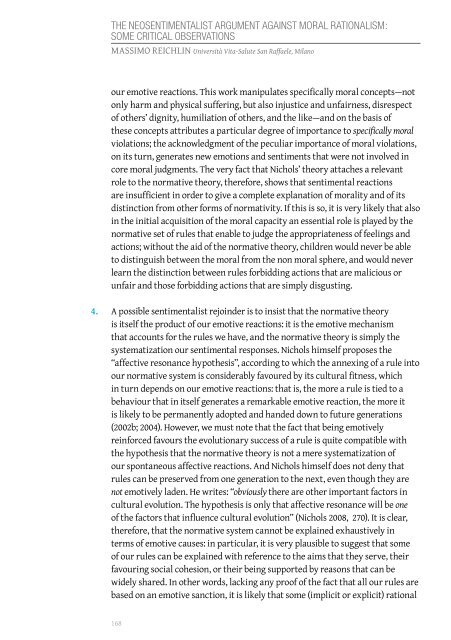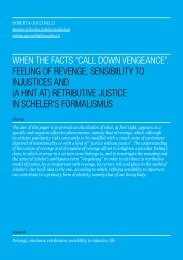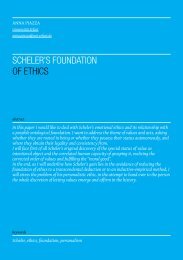the neosentimentalist argument against moral rationalism
the neosentimentalist argument against moral rationalism
the neosentimentalist argument against moral rationalism
You also want an ePaper? Increase the reach of your titles
YUMPU automatically turns print PDFs into web optimized ePapers that Google loves.
4.<br />
<strong>the</strong> neosentiMentalist aRGuMent aGainst MoRal RationalisM:<br />
soMe CRitiCal oBseRVations<br />
massimo reichlin università Vita-Salute San raffaele, milano<br />
our emotive reactions. This work manipulates specifically <strong>moral</strong> concepts—not<br />
only harm and physical suffering, but also injustice and unfairness, disrespect<br />
of o<strong>the</strong>rs’ dignity, humiliation of o<strong>the</strong>rs, and <strong>the</strong> like—and on <strong>the</strong> basis of<br />
<strong>the</strong>se concepts attributes a particular degree of importance to specifically <strong>moral</strong><br />
violations; <strong>the</strong> acknowledgment of <strong>the</strong> peculiar importance of <strong>moral</strong> violations,<br />
on its turn, generates new emotions and sentiments that were not involved in<br />
core <strong>moral</strong> judgments. <strong>the</strong> very fact that nichols’ <strong>the</strong>ory attaches a relevant<br />
role to <strong>the</strong> normative <strong>the</strong>ory, <strong>the</strong>refore, shows that sentimental reactions<br />
are insufficient in order to give a complete explanation of <strong>moral</strong>ity and of its<br />
distinction from o<strong>the</strong>r forms of normativity. if this is so, it is very likely that also<br />
in <strong>the</strong> initial acquisition of <strong>the</strong> <strong>moral</strong> capacity an essential role is played by <strong>the</strong><br />
normative set of rules that enable to judge <strong>the</strong> appropriateness of feelings and<br />
actions; without <strong>the</strong> aid of <strong>the</strong> normative <strong>the</strong>ory, children would never be able<br />
to distinguish between <strong>the</strong> <strong>moral</strong> from <strong>the</strong> non <strong>moral</strong> sphere, and would never<br />
learn <strong>the</strong> distinction between rules forbidding actions that are malicious or<br />
unfair and those forbidding actions that are simply disgusting.<br />
a possible sentimentalist rejoinder is to insist that <strong>the</strong> normative <strong>the</strong>ory<br />
is itself <strong>the</strong> product of our emotive reactions: it is <strong>the</strong> emotive mechanism<br />
that accounts for <strong>the</strong> rules we have, and <strong>the</strong> normative <strong>the</strong>ory is simply <strong>the</strong><br />
systematization our sentimental responses. nichols himself proposes <strong>the</strong><br />
“affective resonance hypo<strong>the</strong>sis”, according to which <strong>the</strong> annexing of a rule into<br />
our normative system is considerably favoured by its cultural fitness, which<br />
in turn depends on our emotive reactions: that is, <strong>the</strong> more a rule is tied to a<br />
behaviour that in itself generates a remarkable emotive reaction, <strong>the</strong> more it<br />
is likely to be permanently adopted and handed down to future generations<br />
(2002b; 2004). however, we must note that <strong>the</strong> fact that being emotively<br />
reinforced favours <strong>the</strong> evolutionary success of a rule is quite compatible with<br />
<strong>the</strong> hypo<strong>the</strong>sis that <strong>the</strong> normative <strong>the</strong>ory is not a mere systematization of<br />
our spontaneous affective reactions. and nichols himself does not deny that<br />
rules can be preserved from one generation to <strong>the</strong> next, even though <strong>the</strong>y are<br />
not emotively laden. he writes: “obviously <strong>the</strong>re are o<strong>the</strong>r important factors in<br />
cultural evolution. <strong>the</strong> hypo<strong>the</strong>sis is only that affective resonance will be one<br />
of <strong>the</strong> factors that influence cultural evolution” (Nichols 2008, 270). It is clear,<br />
<strong>the</strong>refore, that <strong>the</strong> normative system cannot be explained exhaustively in<br />
terms of emotive causes: in particular, it is very plausible to suggest that some<br />
of our rules can be explained with reference to <strong>the</strong> aims that <strong>the</strong>y serve, <strong>the</strong>ir<br />
favouring social cohesion, or <strong>the</strong>ir being supported by reasons that can be<br />
widely shared. in o<strong>the</strong>r words, lacking any proof of <strong>the</strong> fact that all our rules are<br />
based on an emotive sanction, it is likely that some (implicit or explicit) rational<br />
168




